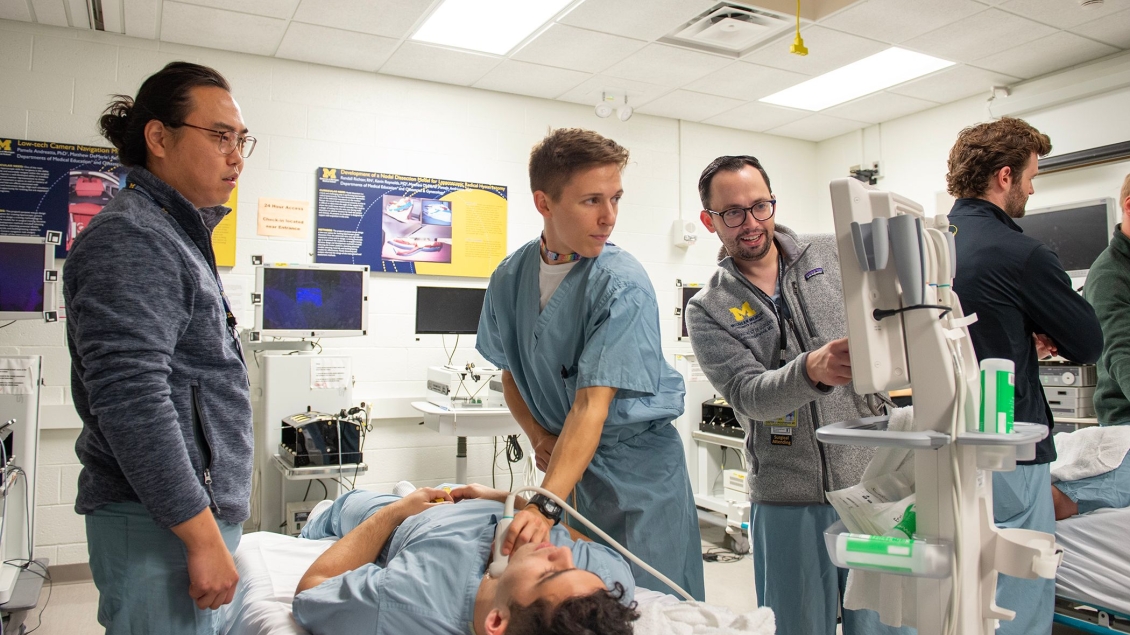
The Integrated Vascular Surgery Residency Program offers unique opportunities in clinical experience and research for trainees throughout their time at U-M Medical School.
Our program dedicates 5 clinical years to progressive training in vascular surgery, leading to primary certification in vascular surgery.
Highlights include:
- A multidisciplinary approach to aortic, peripheral vascular and venous disease
- Exposure to all facets of vascular surgery, including more niche pursuits
- Access to the nationally renowned Frankel Cardiovascular Center, a 425,000-square-foot, $215 million facility with 24 vascular general/moderate care beds, a 24-bed surgical post-procedure ICU, and 11 dedicated cardiothoracic and vascular ORs
The Integrated Vascular Surgery Residency Program is structured to help you build a solid clinical foundation as you advance to progressive independence in the specialty.
- Vascular Surgery at Frankel Cardiovascular Center (CVC): 3 Months
- Superficial Venous: 1 Month
- Multidisciplinary Cardiovascular Clinics (CVC): 1 Month
- Core Surgery (Transplant): 1 Month
- Core Surgery (Vascular/General VAMC): 1 Month
- VA-CT: 1 Month
- Core Surgery (Endocrine/Minimally Invasive ): 1 Month
- Core Surgery (HPB/Surgical Oncology): 1 Month
- Core Surgery (Acute Care Surgery): 1 Month
- Surgical Intensive Care Unit (SICU): 1 Month
- Vascular Surgery at Frankel Cardiovascular Center (CVC): 5 Months
- DVU/Superficial Venous: 1 Month
- Vascular Surgery at Frankel Cardiovascular Center (CVC): 1 Month
- Core Surgery (Vascular/General VAMC): 3 Months
- Surgical Intensive Care Unit (SICU): 1 Month
- Core Surgery (Acute Care Surgery/ECR): 1 Month
- Vascular Surgery at Frankel Cardiovascular Center (CVC): 3 Months
- Endovascular Surgery: 2 Months
- Core Surgery (Vascular/General VAMC): 2 Months
- Core Surgery (Transplant): 1 Month
- Access on Transplant: 1 Month
- Thoracic Surgery: 1 Month
- CT Aortic (CVC): 1 Month
- Vascular Surgery at Frankel Cardiovascular Center (CVC): 3 Months
- CVC (SVA): 2 Months
- SVA (Endo): 2 Months
- Vascular Surgery at Off Site Locations: 1 Month
- Elective Rotation: 1 Month
- Vascular Surgery VAMC: 1 Month
- Vascular Surgery at St. Joseph Mercy Hospital: 2 Months
- Vascular Surgery (CVC): 6 Months
- Endovascular (CVC): 2 Months
- Vascular Surgery VAMC: 2 Months
- Vascular Surgery at Off Site Locations: 1 Month
- Elective Rotation: 1 Month
Between the PGY-3 and PGY-4 clinical training years, residents typically have 2 years of Academic Development Time (ADT). Residents prepare for academic development time during their first three years of residency by becoming familiar with the research being done in the department, developing relationships with primary investigators, and finalizing a research proposal.
Our program provides 2 years of protected and funded academic development time between your third and fourth clinical years.
Highlights include:
- Access to the Section of Vascular Surgery’s robust research enterprise, including the endowed 4,900-square-foot Conrad Jobst Labs, where researchers from across the section share knowledge and central resources to accelerate discovery
- Connections to the Department of Surgery's research communities, such as the Center for Healthcare Outcomes & Policy, which offers a collaborative space for those pursuing outcomes research
- Bimonthly teaching conferences that draw on curriculum developed through an NIH-sponsored program in academic vascular medicine and are attended by faculty, fellows, General Surgery residents, and colleagues from the departments of Radiology and Internal Medicine
- Excellent NIH and DOD funding in the areas of venous thrombosis, vascular trauma, epigenetics/wound-healing and peripheral arterial disease
- Multiple national clinical trials
- Funding for residents to present at regional and national conferences
The Michigan Promise aims to empower faculty members and residents in the Department of Surgery to achieve professional success. We support initiatives connected to environment, recruitment, leadership, achievement, innovation and outreach.
The Department of Surgery has developed a series of professional development initiatives under the Michigan Promise, a commitment to supporting a diverse and inclusive environment in which all individuals can achieve success. This commitment includes a variety of opportunities for residents, such as the Resident Leadership Development Program, in addition to an emphasis on wellness.
Your training ground spans the University of Michigan medical campus, including an adult hospital, a children’s and women’s hospital, a cardiovascular center, multiple outpatient surgery centers and the VA Ann Arbor Healthcare System.
Additionally, the University of Michigan is woven throughout the city of Ann Arbor, giving residents easy access to the countless parks and lively downtown that are a part of life in Ann Arbor.
Christopher Audu, MD, PhD
Gloria Kim, MD, MPH
Scott Robinson, MD, PhD
Anna Boniakowski, MD